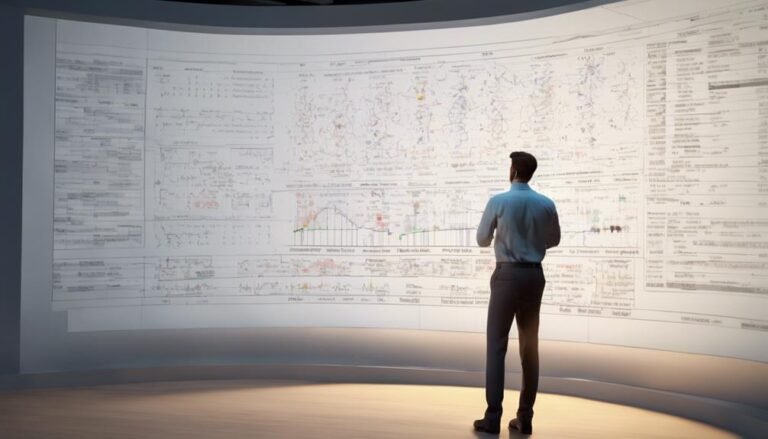Transportation Engineer Job Description
As a transportation engineer, you play an important role in designing and optimizing road networks for efficient traffic flow. Your responsibilities include analyzing traffic patterns, proposing solutions for transportation challenges, and collaborating for infrastructure development. Possessing problem-solving abilities, technical knowledge in civil engineering, and proficiency in CAD software are essential. With abundant career opportunities and promising growth in demand, specializing in emerging technologies like autonomous vehicles is advantageous. Understanding traffic dynamics and developing congestion management strategies are key aspects of your role. Keep exploring the world of transportation engineering for diverse career paths and opportunities for advancement.
Key Takeaways
- Design road networks for optimal traffic flow and safety.
- Analyze traffic patterns and conduct feasibility studies.
- Propose solutions to enhance transportation infrastructure functionality.
- Address transportation challenges and improve roadways.
- Collaborate with stakeholders for effective infrastructure development.
Education and Training Requirements
To become a transportation engineer, you typically need a bachelor's degree in civil engineering or a related field. This educational foundation is essential as it provides you with the necessary technical skills and knowledge to excel in the field.
Job prospects for transportation engineers are generally positive, with the demand for professionals in this field expected to grow in the coming years. Career development opportunities are abundant, with possibilities for advancement into roles such as senior transportation engineer, project manager, or even a leadership position within a transportation organization.
Engaging in continuous learning and staying updated on the latest advancements in transportation technology and infrastructure will be key to your success as a transportation engineer. Pursuing advanced degrees or certifications can also enhance your career prospects and open up new avenues for professional growth.
Responsibilities of a Transportation Engineer
As a transportation engineer, your primary responsibilities include designing road networks to optimize traffic flow and ensure efficient transportation systems.
You'll analyze traffic patterns, conduct feasibility studies, and propose solutions to enhance the overall functionality of transportation infrastructure.
Your expertise in identifying and addressing transportation challenges is vital for creating safe and effective roadways.
Design Road Networks
Designing road networks is a fundamental responsibility of transportation engineers, essential for guaranteeing efficient and safe transportation infrastructure. When designing road networks, you must consider:
- Road design principles: Implementing the best practices to guarantee top road functionality.
- Traffic analysis: Conducting thorough assessments to determine traffic patterns and flows.
- Urban planning: Integrating road networks seamlessly into existing city structures.
- Infrastructure development: Collaborating with other professionals to create a thorough transportation system.
Careful consideration of these aspects is essential to designing road networks that facilitate smooth traffic flow and enhance overall transportation efficiency.
Analyze Traffic Flow
Analyzing traffic flow is a fundamental task for transportation engineers, requiring a detailed understanding of traffic patterns and dynamics. Through traffic analysis, engineers assess the volume and speed of vehicles on roadways to identify bottlenecks and areas prone to congestion.
By utilizing simulation tools and mathematical models, transportation engineers can predict traffic patterns and optimize road networks for efficiency. Congestion management is an essential aspect of this analysis, where engineers develop strategies to alleviate traffic jams and improve overall traffic flow. This involves implementing measures such as signal timing adjustments, lane expansions, or road redesigns.
Skills and Qualifications Needed
You must possess essential skills such as problem-solving abilities and attention to detail to excel as a transportation engineer.
Additionally, qualifications and experience in civil engineering or a related field are vital for this role.
A strong foundation in technical knowledge related to transportation systems and infrastructure is also a necessity.
Essential Skills Required
Proficiency in technical software applications is essential for a transportation engineer, enabling efficient project management and data analysis. To excel in this role, you should possess the following skills:
- Advanced Knowledge of CAD Software: Ability to design transportation systems accurately.
- Familiarity with Traffic Simulation Tools: Essential for analyzing traffic flow and optimizing road networks.
- Strong Data Analysis Skills: Proficiency in interpreting and utilizing transportation data effectively.
- Excellent Communication Abilities: Essential for collaborating with team members and presenting findings to stakeholders.
These skills are essential for ensuring successful project outcomes and contributing to the improvement of transportation infrastructure.
Qualifications and Experience
Moving from the essential skills required for a transportation engineer, the qualifications and experience necessary for this role encompass a blend of technical expertise and practical knowledge in transportation infrastructure development. To excel in the job market, a transportation engineer typically holds a bachelor's degree in civil engineering or a related field. Additionally, gaining relevant work experience through internships or entry-level positions is vital for career progression within the field. Advanced degrees or certifications can further enhance your credentials and open up opportunities for specialization. Continuous learning and staying updated with the latest industry trends are essential for remaining competitive in the transportation engineering sector.
| Qualifications | Experience |
|---|---|
| Bachelor's degree in civil engineering or related field | Relevant work experience through internships or entry-level positions |
| Advanced degrees or certifications | Continuous learning and staying updated with industry trends |
Technical Knowledge Needed
Acquiring a strong foundation in technical knowledge is essential for a transportation engineer, encompassing a diverse range of skills and qualifications crucial for success in the field. When pursuing a career in transportation engineering, you must possess the following key technical knowledge:
- Proficiency in various software applications such as AutoCAD and MicroStation for designing transportation systems.
- Advanced understanding of traffic engineering principles and software like Synchro and VISSIM.
- Knowledge of GIS (Geographic Information Systems) for mapping and analyzing data related to transportation projects.
- Strong project management skills to oversee complex transportation projects efficiently and effectively.
Developing expertise in these areas will enable you to excel in the dynamic field of transportation engineering.
Importance of Transportation Engineering
Understanding the fundamental role of transportation engineering is essential in shaping modern infrastructure and ensuring efficient mobility systems. Transportation engineering plays an important role in urban planning by designing transportation networks that accommodate the needs of growing populations and evolving cities. By integrating various modes of transportation such as roads, railways, and public transit, transportation engineers contribute to the development of sustainable urban environments.
Moreover, transportation engineering is necessary for infrastructure development, ensuring that roads, bridges, and transportation facilities are designed and maintained to meet safety standards and promote seamless connectivity. Through innovative design solutions and advanced technologies, transportation engineers optimize traffic flow, reduce congestion, and enhance overall transportation efficiency.
Typical Work Environment
In a typical work environment, transportation engineers collaborate with various stakeholders to design and optimize transportation systems for efficiency and safety. The workplace dynamics for transportation engineers are characterized by:
- Team Collaboration: Working closely with other engineers, urban planners, government officials, and contractors to guarantee project success.
- Job Challenges: Facing intricate problems such as traffic congestion, infrastructure maintenance, and environmental impact assessments.
- Stress Management: Balancing multiple projects, tight deadlines, and the need for accurate data analysis can be demanding.
- Technical Environment: Utilizing specialized software for traffic modeling, data analysis, and simulation to develop innovative solutions.
Navigating the intricate web of workplace dynamics while addressing job challenges and effectively managing stress is essential for transportation engineers to thrive in their roles.
Career Opportunities and Advancement
Career opportunities and advancement in the field of transportation engineering are abundant for those with expertise in designing and optimizing transportation systems. As a transportation engineer, you can expect promising career growth due to the increasing demand for efficient transportation solutions worldwide. Industry trends show a shift towards sustainable and smart transportation systems, creating new avenues for professionals in this field.
To advance in your transportation engineering career, staying updated with the latest industry trends is essential. Specializing in emerging technologies such as autonomous vehicles, intelligent transportation systems, and sustainable infrastructure can open doors to exciting opportunities. Networking with professionals in the field, pursuing advanced degrees, and obtaining relevant certifications can also enhance your career prospects.
Furthermore, as transportation systems become more complex, the need for skilled engineers continues to rise. This trend not only guarantees job security but also provides scope for progression into leadership roles within transportation agencies, consulting firms, or governmental organizations. By focusing on continuous learning and adapting to industry advancements, you can pave the way for a successful and fulfilling career in transportation engineering.
Salary Range and Job Outlook
With a competitive salary range and a promising job outlook, transportation engineers are in high demand in today's market. Here are some key points to ponder regarding salary trends and job satisfaction in this field:
- Salary Trends: Transportation engineers typically enjoy competitive salaries that reflect their specialized skills and expertise. The compensation often increases with experience and additional qualifications, such as professional engineering licenses.
- Job Satisfaction: Many transportation engineers find fulfillment in their work due to the tangible impact they have on improving transportation systems and infrastructure. The ability to see their projects come to life and enhance the efficiency and safety of travel can be highly rewarding.
- Industry Demand: With the continuous need for better transportation networks and sustainable solutions, the demand for transportation engineers remains strong. This presents stable job security and opportunities for career advancement.
- Career Growth Opportunities: Transportation engineers have diverse career paths to explore, including roles in government agencies, consulting firms, and private companies. Additionally, as they gain experience and expertise, they can progress to leadership positions or specialize in areas such as urban planning or traffic management.
Frequently Asked Questions
Is a Transportation Engineer Responsible for Designing Public Transportation Systems?
As a transportation engineer, you play a vital role in designing public transportation systems, considering public policy implications, safety regulations, traffic management, and funding sources. Your expertise guarantees efficient and safe transportation for communities.
What Software Tools Are Commonly Used by Transportation Engineers?
Imagine being a navigator of digital roads. Transportation engineers commonly rely on traffic simulation software to predict flows and optimize systems. Geographic information systems help map out routes and locations with precision.
How Does a Transportation Engineer Contribute to Urban Planning Projects?
In urban planning projects, you, as a transportation engineer, play a pivotal role in optimizing traffic management and contributing to infrastructure planning. Your expertise guarantees efficient transportation systems that enhance the overall urban environment.
Are Transportation Engineers Involved in Environmental Impact Assessments?
In the domain of environmental impact assessments, transportation engineers play a pivotal role in ensuring compliance with regulations, focusing on sustainability, emission control, and pollution mitigation. Their expertise is vital for promoting eco-friendly transportation solutions.
What Are the Challenges Faced by Transportation Engineers in Developing Countries?
In developing countries, transportation engineers face challenges stemming from infrastructure limitations and funding constraints. These hurdles impact project feasibility, design complexity, and implementation timelines. Overcoming these obstacles requires innovative solutions and strategic planning.
Conclusion
In summary, as a transportation engineer, you're the architect of movement, orchestrating the flow of people and goods with precision and expertise.
Your role is essential in shaping the infrastructure of our world, ensuring safe and efficient travel for all.
With your skills and dedication, you play a significant part in connecting communities and driving progress forward.
So, keep charting the roads of innovation and paving the way to a brighter future.







